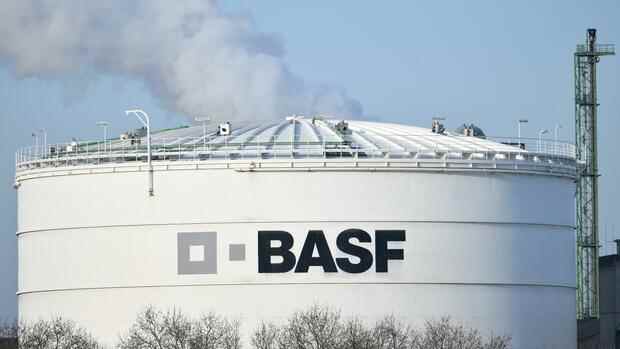The world’s largest chemical company wants to continue growing organically.
(Photo: dpa)
Dusseldorf The chemical company BASF surprisingly announced a billion-dollar share buyback on Tuesday. The company plans to invest around three billion euros in the program from January 2022 to the end of 2023. According to the current price, the repurchase has a volume of five percent of the market value.
With the move, BASF wants to create additional value for shareholders and attract investors. Within a year, the share lost value despite flourishing operational business, while the Dax rose by 18 percent.
The new share buyback program created a good mood on the stock exchange on Tuesday. The BASF share gained a good four percent in value by the afternoon and was quoted at 65 euros.
Such programs can pay off for investors: BASF does not want to keep the shares as reserve currency for possible acquisitions, but instead wants to withdraw them permanently. This increases the earnings per share for the remaining shares. In most cases, a company supports the course in the long term.
Top jobs of the day
Find the best jobs now and
be notified by email.
It should also be important for BASF shareholders that the buyback program should not come at the expense of dividends. The chemical company wants to keep its line and increase the dividend every year. In 2020, BASF made an exception to this because of the pandemic. For 2021, however, analysts expect an increase of ten cents to EUR 3.40 per share.
2021 was a record year for BASF
Because it was probably one of the most successful years in the recent history of BASF. The board of directors expects sales between 76 and 78 billion euros, at best that would be an increase of 33 percent. The profit before special items (EBIT) could more than double to around eight billion euros.
BASF explicitly justifies the announced share buyback with this positive business development as well as with the income from partial sales. In June, the group completed the sale of its color pigments business for 1.15 billion euros to the Japanese company DIC.
Finally, in autumn, the closing for the sale of 49 percent of the water treatment specialist Solenis, which went to the financial investor Platinum, was added. This deal, too, is likely to have brought the Ludwigshafen-based company more than a billion dollars into the coffers.
The BASF Annual General Meeting still has to approve the planned share buyback beyond May 2022. Investment bank Jefferies commented on the program as a “serious signal” that investors should participate in the chemical company’s earnings and cash development. Jefferies expects the dividend to rise and recommends buying the share with a price target of 85 euros.
In fact, BASF will be able to easily afford a higher distribution of more than three billion euros for 2021. This will yield the freely available cash flow, which analysts estimate at around five billion euros.
BASF focuses on its own growth
In addition, contrary to what investment bankers suggest, there are no major acquisitions pending at BASF. CEO Martin Brudermüller has repeatedly stated that he wants to advance the company on his own by investing in future businesses.
On Tuesday, BASF underlined that it will “continue to prioritize organic growth in the use of funds, while acquisitions are currently of lesser importance for the company”.
But that in turn does not mean that BASF does not have a greater need for capital. The group has announced investments in the double-digit billions for the next few years. Operationally, two projects are in the foreground.
On the one hand, BASF is building a global leadership position in battery chemistry for electromobility. The group specializes in cathode material, the most expensive part of lithium-ion batteries. Four billion euros flow into production and innovative recycling systems.
On the other hand, BASF is banking on a sustained chemical boom in China. There the group is building a second huge Verbund site for almost ten billion euros. It is supposed to supply the rapidly growing industry in southern China with chemicals and plastics.
More climate-friendly production is likely to cost billions
In addition, there is the conversion to a more climate-friendly production method with significantly lower CO2 emissions. This conversion and the high demand for renewable electricity will cost BASF billions in the coming years.
That means: BASF’s business must continue to generate enough income to be able to finance dividend increases and share buybacks in addition to the numerous investment projects. With the announcement made on Tuesday, management demonstrated a certain degree of confidence.
But it is also clear that the boom in BASF’s business in 2021 will be due to a few special factors. The basic chemicals businesses in particular earned splendid earnings. There were numerous production and delivery bottlenecks across the industry after the global economy suddenly picked up. Sales prices skyrocketed. This effect is likely to weaken in the course of 2022.
In any case, fresh money will come into the BASF coffers through further partial sales – above all through the IPO of the oil and gas subsidiary Wintershall. BASF’s majority stake is estimated at around twelve billion euros.
More: “Flank god of German industry” – You should watch out for these six chemical companies in 2022
